#Alfred Barr
Explore tagged Tumblr posts
Text
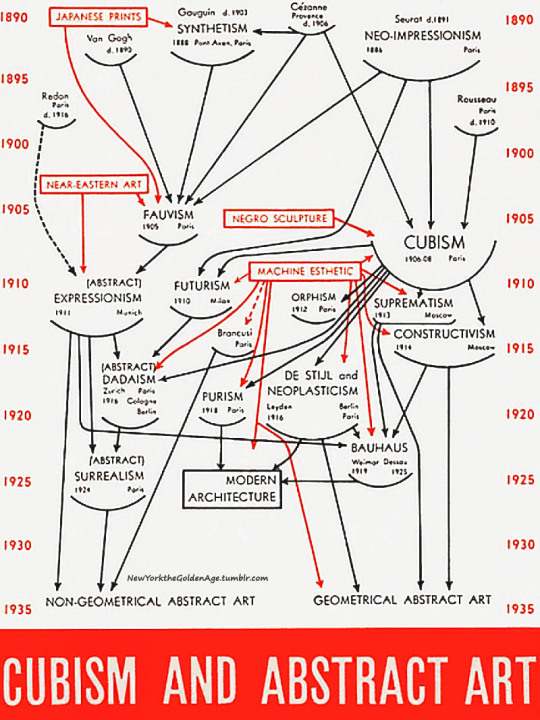
The Museum of Modern Art opened its new building (the one we know today) on May 10, 1939. This timeline infographic (although they didn't use the word then) was drawn by Alfred Barr, the museum director, three years earlier for the cover of the catalog of an exhibit of Cubism and abstract art.
Photo: The Art Story
#vintage New York#1930s#MoMA#Museum of Modern Art#Alfred Barr#art exhibit#exhibit catalog#abstract art#Cubism#modern art#May 10#10 May#vintage NYC
52 notes
·
View notes
Text
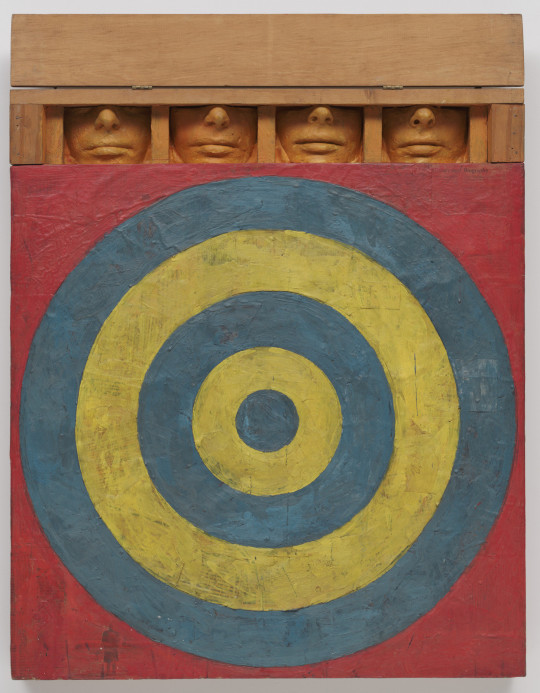
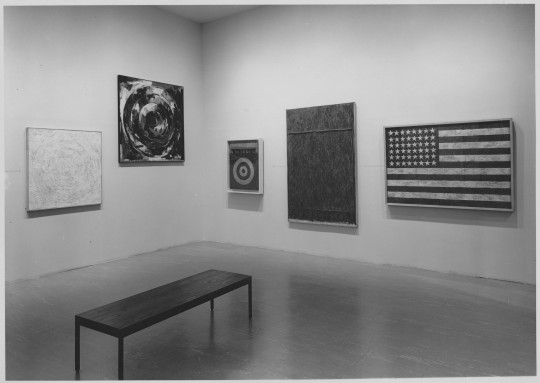
In 1958 MoMA bought four works from the first solo show of an unknown, 27yo painter, Jasper Johns. Two years later, the Museum backdated the credit line for Target with Four Faces (1955) to say that it had been a gift of the collectors Ethel & Robert Scull. Johns protested this distortion of the painting's history at the time, he told me in an email, but he was ignored.
#jasper johns#robert scull#the museum of modern art#alfred barr#scullduggery#emailing with jasper johns#which time tho
22 notes
·
View notes
Text

Batman: Full Circle (1991) by Mike Barr & Alan Davis
#batman#robin#dick grayson#alfred pennyworth#richard grayson#mike barr#alan davis#dc#dc comics#90s#comics
126 notes
·
View notes
Text

Batman: Bride of the Demon
Volume: 1
Issue: 1
Writers: Mike W. Barr
Pencils: Tom Grindberg
Inks: Tom Grindberg
Colours: Eva Grindberg
Covers: Tom Grindberg
DC
#Batman: Bride of the Demon#Batman#Bruce Wayne#Mike W. Barr#Tom Grindberg#Eva Grindberg#Dc Comics#Tim Drake#James Gordon#Alfred Pennyworth#Ra's al Ghul#Talia al Ghul#League of Assassins
18 notes
·
View notes
Text

Alfred H. Barr Jr., Cover of the Exhibition Catalogue ‘Cubism and Abstract Art’ MoMA, 1936. The Museum of Modern Art Library, New York. MA143, DIGITAL IMAGE © 2023, The Museum of Modern Art/Scala, Florence.
(Source)
1 note
·
View note
Text

Alfred H. Barr - Cubism and abstract art
0 notes
Text
Hi-Lo Arthuriana
Have a high interest in Arthurian Legend but low readability?
Here's a collection of adapted or abridged books to help ease you into the literary tradition. This list is ordered from simplest to most complex, beginning with picture books and ending with "translations" of Middle English texts into modern English or abridged versions of longer texts such as the Vulgate. Books in a series are numbered.
As always, if the book is still in print, I link to the Internet Archive to read, Goodreads to learn more, or where you can purchase. Supporting living authors is very important! Otherwise, enjoy a PDF, on me, to keep the legacy of these authors alive.
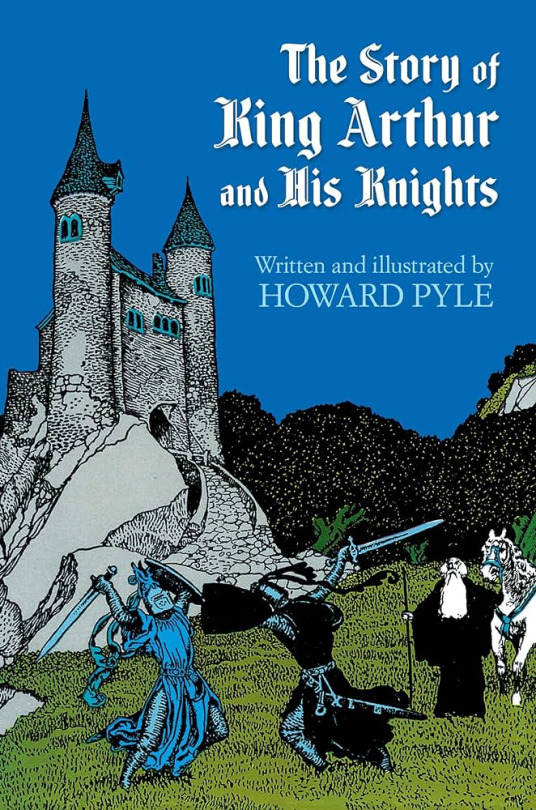
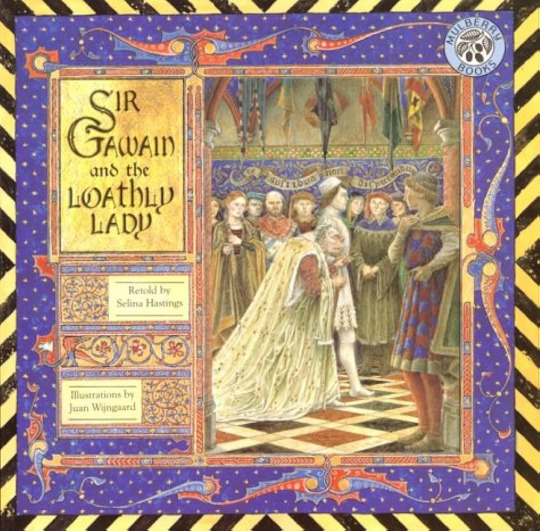
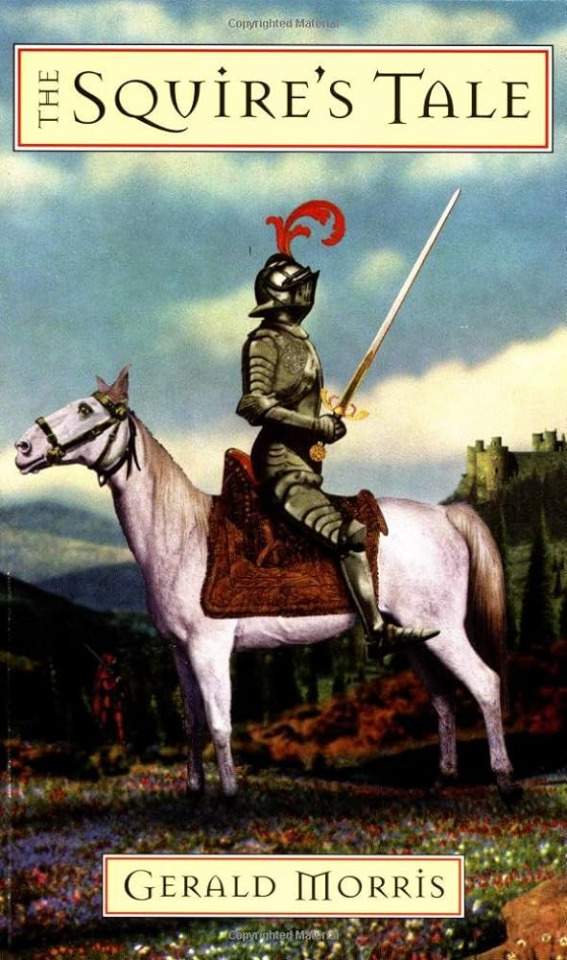
Picture Books
Young Merlin (Young Series #1) by Robert D San Souci & Jamichael Henterly (1989)
Tales From the Mabinogion Gwyn Thomas, Kevin Crossley-Holland, & Margaret Jones (1992)
Sir Gawain and The Loathly Lady by Selina Hastings & Juan Wijngaard (1985)
The Quest for Olwen by Gwyn Thomas, Kevin Crossley-Holland, & Margaret Jones (1988)
The Kitchen Knight by Margaret Hodges & Trina Schart Hyman (1990)
Sir Gawain and The Green Knight by Selina Hastings & Juan Wijngaard (1991)
The Tale of Taliesin by Gwyn Thomas, Kevin Crossley-Holland, & Margaret Jones (1992)
Young Guinevere (Young Series #2) by Robert D San Souci & Jamichael Henterly (1992)
The Knight with The Lion by John Howe (1996)
Young Lancelot (Young Series #3) by Robert D San Souci & Jamichael Henterly (1996)
Young Arthur (Young Series #4) by Robert D San Souci & Jamichael Henterly (1997)
Sir Gawain and The Green Knight by Michael Morpurgo & Michael Foreman (2004)
Perceval: King Arthur's Knight of The Holy Grail by John Perkins & Gennady Spirin (2007)
Comics
Prince Valiant by Hal Foster & many others (1937-present)
Camelot 3000 by Brian Bolland and Mike W. Barr (1982-1985)
Arthur, King of Time and Space by Paul Gadzikowski (2004-2014)
Tristan & Isolde: The Warrior and The Princess by Jeff Limke (2008)
Muppets King Arthur by Paul Benjamin & Patrick Storick (2010)
Children's Chapter Books
The Adventures of Sir Lancelot the Great (The Knights' Tales #1) by Gerald Morris (2009)
The Adventures of Sir Givret the Short (The Knights' Tales #2) by Gerald Morris (2009)
The Adventures of Sir Gawain the True (The Knights' Tales #3) by Gerald Morris (2013)
The Adventures of Sir Balin the Ill-Fated (The Knights' Tales #4) by Gerald Morris (2013)
The Legends of King Arthur: Merlin, Magic, and Dragons (#1-#10) by Tracey Mayhew (2020)
Intermediate Retellings
The Idylls of The King by Alfred Lord Tennyson (1859)
The Story of King Arthur and His Knights (#1) by Howard Pyle (1903)
The Story of the Champions of The Round Table (#2) by Howard Pyle (1905)
The Story of Sir Launcelot and His Companions (#3) by Howard Pyle (1907)
The Story of The Grail and The Passing of Arthur (#4) by Howard Pyle (1910)
Hero Myths & Legends of the British Race by M. I. Ebbutts (1910)
The Squire’s Tale (The Squire’s Tales #1) by Gerald Morris (1998)
The Squire, His Knight, and His Lady (The Squire’s Tales #2) by Gerald Morris (1999)
The Savage Damsel and The Dwarf (The Squire’s Tales #3) by Gerald Morris (2000)
Parsifal’s Page (The Squire’s Tales #4) by Gerald Morris (2001)
The Ballad of Sir Dinadan (The Squire’s Tales #5) by Gerald Morris (2003)
The Princess, The Crone, and The Dung-Cart Knight (The Squire’s Tales #6) by Gerald Morris (2004)
The Lioness and Her Knight (The Squire’s Tales #7) by Gerald Morris (2005)
The Quest of The Fair Unknown (The Squire’s Tales #8) by Gerald Morris (2006)
The Squire’s Quest (The Squire’s Tales #9) by Gerald Morris (2009)
The Legend of The King (The Squire’s Tales #10) by Gerald Morris (2010)
Abridged Medieval Literature Translations
Sir Gawain and The Green Knight (Unrepresented #1) by Jessie Weston (1889)
Tristan & Iseult (Unrepresented #2) by Jessie Weston (1899)
Guingamor, Lanval, Tyolet, Bisclaveret (Unrepresented #3) by Jessie Weston (1900)
Morien (Unrepresented #4) by Jessie Weston (1901)
Sir Cleges, Sir Libeaus Desconus (Unrepresented #5) by Jessie Weston (1902)
Sir Gawain At The Grail Castle (Unrepresented #6) by Jessie Weston (1903)
Sir Gawain & The Lady of Lys (Unrepresented #7) by Jessie Weston (1907)
The Story of Sir Galahad by Mary Blackwell Sterling & William Ernest Chapman (1908)
The Romance of King Arthur and His Knights of The Round Table by Alfred W Pollard & Arthur Rackham (1917)
Le Morte d'Arthur by Keith Baines (1962)
The Lancelot-Grail Reader by Norris J. Lacy (2000)
Lancelot and The Lord of The Distant Isles by Patricia Terry, Samuel N. Rosenberg, & Judith Jaidinger (2007)
The Wedding of Sir Gawain and Dame Ragnell by David Breeden (????)
Informational Resources
Warriors of Arthur by John Matthews, Bob Stewart, & Richard Hook (1987)
The New Arthurian Encyclopedia by Norris J. Lacy (1991)
The Arthurian Companion by Phyllis Ann Karr (1997)
The Arthurian Name Dictionary by Christopher W. Bruce (1999)
#arthurian legend#arthurian legends#arthuriana#arthurian mythology#arthurian literature#arthurian preservation project#my post
501 notes
·
View notes
Text

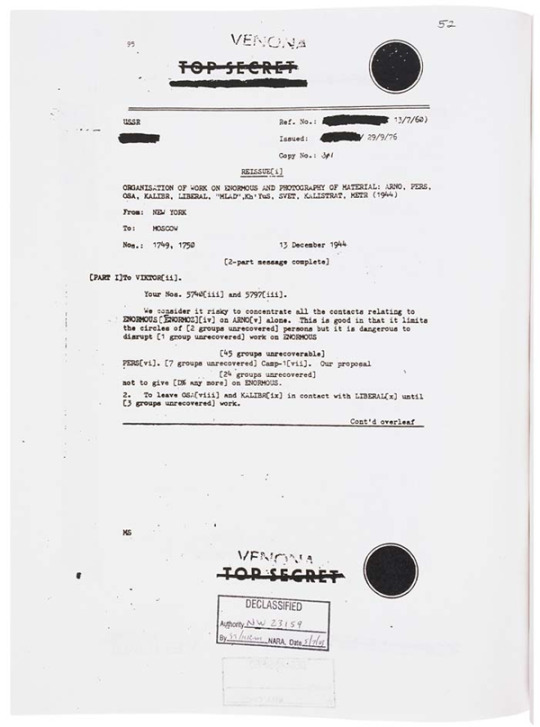
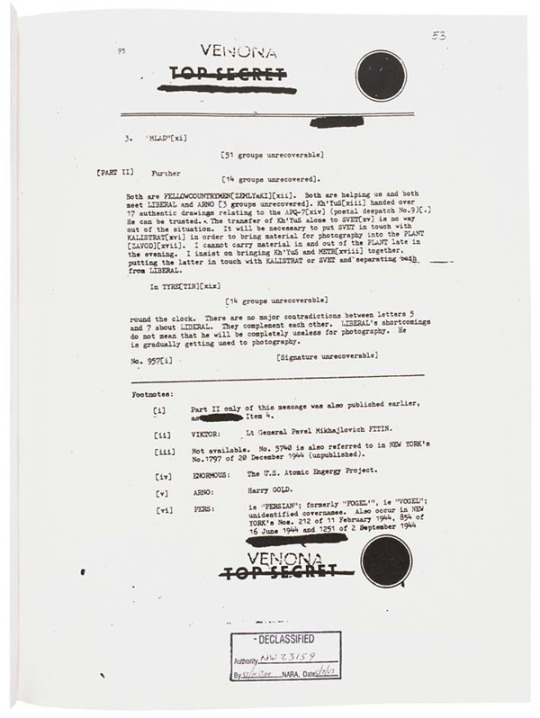
Decryption of Soviet Diplomatic Telegram Relating to the Code Name "Enormous" and Photography of Material
Record Group 457: Records of the National Security Agency/Central Security ServiceSeries: Public Release Copies of Records Relating to Project VenonaFile Unit: First Venona Release
VENONA
TOP SECRET [scratched out]
[redacted]
[redacted]
[vii] CAMP-1: Not identified; probably an atomic energy side 9cf references to "Camp-2" and "camps" in eg NEW YORK's No. 1585 of 12 November 1944 and 709 of 5 July 1945 ([redacted]).
[viii] OSA: ie "WASP"; Ruth GREENGLASS.
[ix] KALIBER: ie "CALIBRE"; David GREENGLASS.
[x] LIBERAL: Julius Rosenberg.
[xi] MLAD: ie "YOUNG"; [redacted]
[xiii] Kh'YuS: ie "HUGHES"; Alfred Epaminondas SARANT, who was employed at the BELL Telephone Laboratories [cf. Footnote [xiv]) NEWYORK CITY, from October 1942 to September 1946.
[xiv] APQ-7: Or AN/APQ-7: a high-resolution airborne radar developed by the MASSACHUSETTS Institute of Technology and built BELL Telephones (cf Footnote [xiii]) in the 1940s.
[xb] SVET: ie "LIGHT'"; possibly Aleksander Andreevich RAEV.
[xvi] KILISTRAT: ie "CALISTRATUS"; Aleksander Semenovhich FOMIN.
[xvii] PLANT: The Soviet Consulate.
[xviii] METR: ie "METRE"; Joel BARR.
[xix] TYRE: NEW YORK CITY.
VENONA
TOP SECRET
[scratched out]USSR Ref No. [redacted] 13/7/60)
[Redacted] Issued [redacted] 29/9/76
Copy No. 301
REISSUE [i]
ORGANISATION OF WORK ON ENORMOUS AND PHOTOGRAPHY OF MATERIAL: ARNO. PERS. OSA. KALIBER. LIBERAL. "MLAD". Kh' YuS, Svet. KALISTRAT. METR (1944)
From: NEW YORK
To: MOSCOW
Nos.: 1749, 1750 13 December 1944
[2-part message complete]
[PART I] To Viktor [ii].
Your Nos. 5740[iii] and 5797[iii].
We consider it risky to concentrate all the contacts relating to ENORMOUS [ENORMOZ] [iv] on ARNO [v] alone. This is good in that it limits the circles of [2 groups unrecovered] persons but it is dangerous to disrupt [1 group unrecovered] work on ENORMOUS
[45 groups unrecoverable]
PERS[vi]. [7 groups unrecovered] Camp-1 [vii]. Our proposal
[24 groups unrecovered]
not to give [D5 any more] on ENORMOUS.
2. To leave OSA[viii] and KALIBER[ix] in contact with LIBERAL[x] until [3 groups unrecovered] work.
Cont'd overleaf
VENONA
TOP SECRET [scratched out]
DECLASSIFIED
Authority NW 23159
By [illegible] NARA, Date 5/7/03
[Complete document and transcript at link]
107 notes
·
View notes
Note
Adding onto the ask about smoking/vaping— I like your hc that Bruce tried it once and didn’t like it
Instead, I hc that Bruce and Harvey would do acid sometimes in college <3 along with the occasional psychedelics
+ their first time on shrooms went something like this:
*Bruce and Harvey, laying on the grass in the garden of Wayne Manor at midnight*
Harvey: the Barr test is like a bar I have to test with the law and I test the law… with a bar. Oh my god I literally teststin’ the law with a bar. A solid pipe would be better. Maybe a wrench. Jesus. Holy shit. Brucie. Sweetheart. I gotta be trainin’ harder for this thing. Babydoll. We gotta hit the gym together. Can you buy out the gym? We gotta gym the law with a bar. Get Jim to help us. Your father work/ed with him, right? Goddamn. Jim is hitting the law. With a gor on the din. Hm. We betta’ catch that Penguin bastard. Quackity fuck. ‘Ll see if he can “Wha Wha!” his way out of charges for fuckin’ tax evasion. What a bastard. Hm. His shrooms are greaaatt tho... Brucie, honey, we gotta pile up on these before taking his ass down-
Bruce, eyes wide: Gothnmam ha,s neve,,,r been so colorful ^~^ It’sssssss so.v many colors ^•o•^!,¡¡!! Tttaht’s so nice |! >#<
*Meanwhile, in the manor*
Alfred, watching the two with the clearest line of sight from his bedroom window, sighing with reluctant fondness : the boy is just like his mother
Dude I love this but fun fact: I LITERALLY headcanon Thomas took Bruce to a recovery center, which was as ethical as anything else in Gotham, and went “you can do what you want :) but are you sure you want to end up here :) are you really sure :))”
Either that or simply asks Gordon to show him Drop houses. Sure, it’s harsh, but it’s a reality Bruce will have to look in the eye. Unless Thomas FIXES it, which of course he will (spoiler alert: he didn’t)
(PS this is NOT an effective parenting method and Thomas slept in the attic for a week after Alfred found out)
#Thomas’ overprotectiveness manifests in very :/ ways#like hey I appreciate you wanting to protect your kid. maybe don’t traumatize him in the process#bruce wayne#harvey dent#thomas wayne#batfamily#text
357 notes
·
View notes
Text
Berenice Abbott in Philip Johnson’s apartment
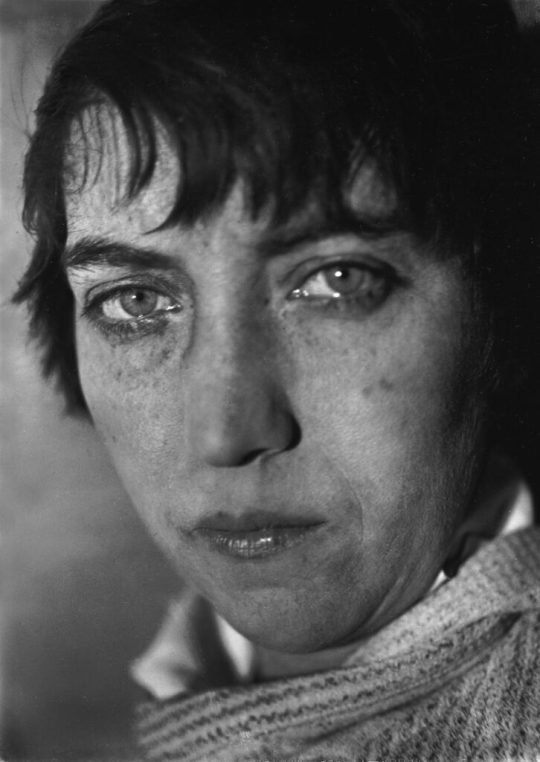
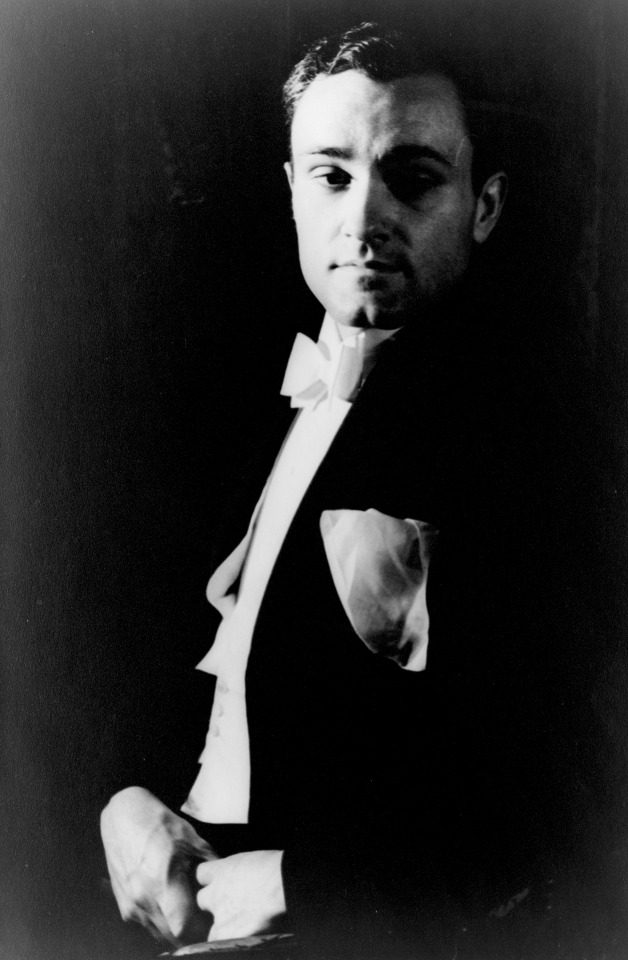
Berenice Abbott, 1930 (Walker Evans) / Philip Johnson, 1933 (Carl Van Vechten)
These portraits are the most obvious choices from this time period and conveniently suggest the biographical contrast between the two: Abbott had been a struggling American artist in Paris, an assistant to Man Ray, but she later established a portrait business, built a reputation and gained a steady flow of sitters. In January 1929, at age 30, she left for New York.
Abbott departed on the ship from France with the archive of Eugène Atget: 17 crates according to the Julia van Haaften's biography. She naively thought selling Atget prints and licensing would provide a healthy income.
The new architecture of the city enthralled her and Abbott quickly began to conceive and photograph a topographic survey of the city. By fall 1929 the stock market had crashed, the Great Depression had begun and the portrait business was no longer promising. Abbott wanted to charge $150 a portrait, at a time when you could get one done for a dollar. This environment forced her to change business models, looking for patrons for the New York project.
Abbott first encountered Philip Johnson in New York in 1931, at the “Rejected Architects” exhibit, a salon des refusés for modern architects and an early introduction of the International Style to New York.
Johnson was a 25-year-old who came from inherited wealth. Rachel Maddow’s "Prequel: An American Fight Against Fascism" suggests his portfolio produced, in today’s dollars, from $240,000 to $1.2M in dividends a year. His financial backing of the architecture department at MOMA resulted in him becoming director of that department. He had discovered Mies van der Rohe on one of his traipses across the continent and was eager to bring the new style to New York. While Johnson was financially very comfortable, he had unsatisfied ambitions, larger than being a curator of architecture and beyond architecture itself.
In 1932 Abbott was part of MOMA’s Murals by American Painters and Photographers exhibit, which Johnson certainly would have been aware of, if not directly involved in, as the point of the show was large modern murals for architecture projects such as Rockefeller Center in the form of seven by twelve foot murals. Greg Allen has the backstory on that exhibit (since his 2010 post the full catalog with her photos has been published on the MOMA site).
For her New York survey, Abbott was looking for $18,750 ($390,000 in today’s dollars), enough to fund a year long project, travel, a car with two full time assistants to deliver 350-500 prints and negatives. Johnson did not financially support Abbott’s New York project, nor did the museum sponsor it, but he offered a strong letter of recommendation, on MOMA letterhead: "You have a deep love for New York, you are an excellent photographic technician and you have the artistic power of selecting the essential."
The goal was to find 75 patrons among the wealthy MOMA donors to contribute $250 each. Despite Johnson’s endorsement, this fundraising effort was a flop. It would take her until 1940 to finish it, but "Changing New York" became one of the great photographic projects of the 20th century.
Van Haaften describes an architecture and photography exhibition Johnson and Abbott planned to do together, called "America Deserta," about the visual repercussions of the Depression. It sounds like an early version of what we now call "ruin porn." She writes that Johnson could have financed the project out of his own pocket, but neither he, nor the museum, pulled the trigger. (Decades later, architecture critic Reyner Banham wrote an excellent book about the actual desert titled "Scenes in America Deserta")

Johnson was doing interior design in New York for friends and acquaintances, hoping the examples of his work could help establish him (and the International Style he had signed on with). An early project was for MOMA’s Alfred Barr. Mark Lamster writes in "Man in the Glass House" that Barr couldn’t afford the real Mies furniture that Johnson had already acquired for himself, so Johnson designed knock-off tubular chairs.

cover of Arts and Decoration, September 1933, from the Burlingame, California library via archive.org
Johnson’s own apartment was his first top-to-bottom interior design project. He was eager, bordering on desperate to get paying clients, to establish himself. He didn't need the money, but wanted clients as a stamp of approval from the New York elite, like the Rockefellers. He enlisted Abbott to take photos to premiere it in Arts and Decoration magazine.

The International Style had already taken root in Los Angeles, but New York was not ready for what he was offering. Perhaps Abbott’s photos of his apartment are part of why the new thing seemed unconvincing. Starting with the watercolor cover or paging through this magazine aimed at the wealthy, the features contrast traditional style versus examples of the new style.
If you've never been in a modern interior before and these photos are your first glimpse, it's not appealing. Johnson was no Neutra and he had not found his Julius Shulman. The magazine's reproduction quality of the photography is not good. Abbott's photographs feel cramped. The lighting is a combination of murky corners and distracting shadows. The styling, a fiddle leaf fig, the place settings at the dining table, feels forced.
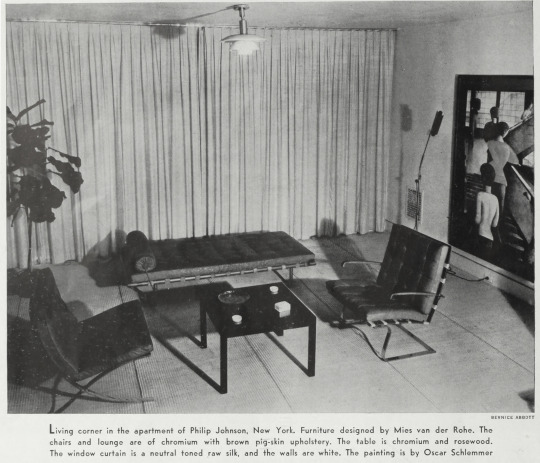
In terms of art history, the most interesting of Abbott's photographs features a painting directly from the Bauhaus. It's Oskar Schlemmer's Bauhaus Stairway (1932). Lamster outlines the very messy deal that brought the painting to New York. In March 1933 Barr asks Johnson to buy it, unseen, thinking it will end up at MOMA. As the Nazis breathe down Schlemmer's neck for being a "degenerate artist," Johnson sends a telegram offering a price, but then claims a typo added a zero and pays 10x less. This dispute isn't resolved until after the year 2000. Johnson keeps the painting in his collection for another ten years.
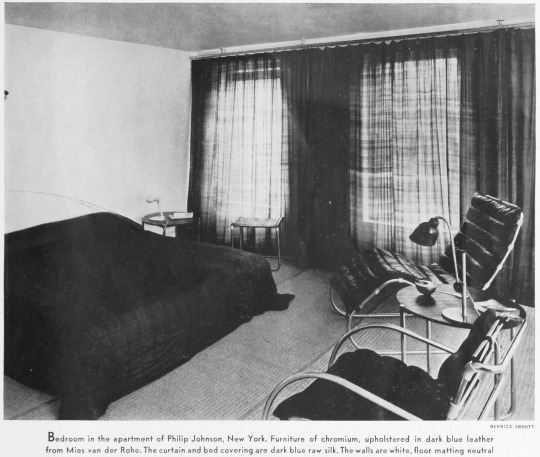
the captions drop the "e" Abbott had added to her name (Bernice vs Berenice).
What explains the vast difference between the great photos Abbott is making on the streets of New York and these mediocre interiors? She creates "Exchange Place" the same year. Spending time with Abbott’s archive on NYPL and Getty looking for interior photos to compare to these photos of Johnson's apartment to, left me with another question: Why are photographs of interiors uncommon until the 1940s? In her Paris portraits the interior of her studio plays a significant role as background.
Van Haaften writes that Abbott is using two cameras in these early years in New York:
5x7 inch view camera (with reducing back to 12x9cm, which is a large “medium format” negative )
Graflex that she acquired to do portraits of Guggenheim children (probably a 4x5 inch press style camera).

Abbott is on a ladder to make the photographs of Johnson's place and perhaps the combination of lens focal length and the size of the apartment presented a challenge in creating enough space. It’s possible, despite the two cameras, that she simply didn’t have a wide enough lens to do interior work at a time when lenses were expensive and money was tight. Or that she didn’t prefer to use spotlights or flash. Perhaps her focus was so intense on the exterior of the city that she rarely set up the camera indoors.
For Johnson, it’s possible to imagine if New York had been more open to the new style, if the magazine caused a stir, if he was encouraged to become an architect at this moment, his descent into fascism would have never happened. After the photos are published in the September 1933 issue, 1934 is a rollercoaster year for Johnson: he has a breakout hit of an exhibit in Machine Art (March-April). But by December, he quits MOMA to focus on his fascist party. He’s 28 years old. His pursuit of the fantasy of a domestic version of Nazism brings him to Germany, to cheer on the invasion of Poland. Lamster writes that he only to returns to architecture in 1941, when it’s clear that he has barely escaped being charged with treason. He goes from being a millionaire who shipped his own car to Europe for his Nazi tour to cleaning Army toilets.
Van Haaften’s biography of Berenice Abbott is not specific about when Abbott broke off her friendship with Johnson. We can assume it happens sometime between the apartment photoshoot and Johnson leaving MOMA. Abbott was a communist or socialist for most of her life and American Nazis like Johnson were very clear on what they would do to communists if they gained power. Van Haaften writes: "the two friends later parted ways over Johnson’s political views and his enthusiasm for the Third Reich." The book's footnote indicates the source for this is her 1993 phone interview with … Philip Johnson.
21 notes
·
View notes
Text

Edward Hopper, Manhattan Bridge Loop, 1928. Oil on canvas.
Describing his aims in Manhattan Bridge Loop, Hopper explained that the painting’s horizontal composition was an attempt to give “a sensation of great lateral extent” and bring attention to the cityscape beyond the frame; “I just never cared for the vertical,” he later quipped. His depictions of the wide spans of the city’s bridges, its industrial landscapes, and its low-slung buildings elevate the quotidian and prosaic over the iconic, offering a powerful counterpoint to the awe-inspiring views of the New York skyline celebrated in the news and in works by many of his contemporaries. Alfred H. Barr observed of Hopper’s work in 1933: “His indifference to skyscrapers is remarkable in a painter of New York architecture.”
Photo & text: Whitney Museum of American Art
#vintage New York#1920s#Edward Hopper#painting#oil painting#Manhattan Bridge Loop#realism#pittura#peinture#artwork
115 notes
·
View notes
Note
Hey, sorry to bother you but I was wondering, based on your latest post, if you have any Leslie Thompkins recommend reads? I'd like to read more about her but I don't really have the time to read everything she has been on and those are the only reading guides I seem to able to find. Thank you in advance.
Oooh, Leslie recs. Leslie is a Dennis O'Neil creation, which means a lot of her best stories are actually found in the period when O'Neil was head of the Bat office. A lot of his characters got expanded, made more complex and given more importance because Bat writers were suck ups respected Denny and liked to acknowledge his impact on the broader narrative.
Recs can be a bit hard, as she's often in the middle of other stories, and the additional context adds a lot, but for my mind, here's a bunch of suggestions (with explanations beside them):-
A bunch of the earlier stories are sort of repetitive, and pre-Crisis Leslie is not quite the same character as post-Crisis Leslie. If you want a taste, Batman #457, "There is No Hope in Crime Alley" gives you the initial premise of Leslie as the woman who was there to comfort Bruce immediately after his parents were shot, and who is a committed pacifist interested only in helping the community.
However, a better start would probably be Batman: Legends of the Dark Knight #21-23. Mike Barr's essentially the creator of the concept of Leslie Thompkins' Clinic (it first features in the last page of his Batman Year Two), and this story both retells Leslie and Bruce's history together, but also wrestles with how Leslie sees both Bruce and Batman and their violence, and her desire to help fix the city in a pacifist, hands-on manner.
There's some good stuff in Knightquest actually but extracting it is a bit of a mess: you want Batman #505 and Batman: Shadow of the Bat #26 & 27. I'm a big fan of the Abattoir arc in Knightquest, which this forms part of, and this is about Leslie's work helping underprivileged kids in Gotham - in this case counselling some traumatised Wayne Foundation kids.
Batman: Legends of the Dark Knight #118: This is a No Man's Land story set in Leslie's refugee camp where Alfred comes to tell stories to the kids. Just a good look at the work Leslie was doing.
Batman Chronicles #18 "Spiritual Currency": this is one of the stories I referenced. Set during No Man's Land, it's an argument between Leslie and Bruce over her treating Zsasz, who is badly injured. Probably my favourite encapsulation of Leslie's personal philosophy.
Gotham Knights #7: part of the 'Bruce interrogates his psyche and connections to those he's close to' arc that ends in Transference. This one's about Leslie and Alfred's feelings over caring for Bruce.
Detective Comics #791-793: I wouldn't say these are the best Leslie Thompkins stories in existence, but I will say the discussions between Leslie and Bruce in them are on point, and are part of the lead in to where War Games ends up. Enjoy them for Leslie's philosophy, sigh deeply at the inherent racism.
War Games, in particular War Crimes, are a massive part of the Leslie narrative but also where a lot of problems arise. War Games in and of itself would be okay, and her fight with Bruce while she's treating Steph is quite in line with the story immediately above; it's War Crimes that really contains the massive retcon that does a lot of harm to Leslie's character.
As far as post-return to Gotham preboot stories, I think the best ones are actually her appearances in the Hit List of Red Robin #15-16. Leslie's got the Cavalier working for her to protect the clinic! Her comments to Tim when he protests it are so Leslie.
New 52 Leslie is essentially a different character; she's premised as a social worker who works with Julie Madison and is assigned to Duke Thomas among others.
In Rebirth she's returned to being the Leslie of preboot. Her better stories are the following:-
The Victim Syndicate in Detective Comics #943-947: The first victims of various villains want to remove the Bats from Gotham. Leslie, Steph and Harper Row are quite interesting in this in terms of a narrative over different ways to help Gotham.
Detective Comics #964 "Dystopia": Leslie is involved in Lonnie Machin's premised underground anarchist commune for the underprivileged. Follows up on the earlier story.
Punchline #1 and The Joker #1-15: this is a long arc about Leslie and the Rows working to have Punchline tried properly in court as complicit in her actions. It's the backup story to the Joker and it's been published separately as a trade.
19 notes
·
View notes
Text

Detective Comics #573 (1987) by Mike Barr, Alan Davis & Paul Neary
#jason todd#detective comics#alfred pennyworth#robin#batman#bruce wayne#mike barr#alan davis#paul neary#dc#dc comics#80s#80s comics#comics
36 notes
·
View notes
Text

Batman: Son of the Demon
Volume: 1
Issue: 1
Writers: Mike W. Barr
Pencils: Jerry Bingham
Inks: Jerry Bingham
Colours: Jerry Bingham
Covers: Jerry Bingham
DC
#Batman: Son of the Demon#Batman#Bruce Wayne#Mike W. Barr#Jerry Bingham#Alfred Pennyworth#Damian Wayne#Grind#James Gordon#Joe Chill#Martha Wayne#Melisande al Ghul#Qayin#Ra's al Ghul#Ronald Reagan#Talia al Ghul#Thomas Wayne#DC
3 notes
·
View notes

